Correspondent’s View
October 1942, Australian journalist, George H. Johnston, recorded his graphic account of the rigors, of what he called, the toughest fighting in the world: 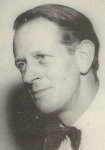 “The insect life, from scorpions to butterflies, is impressive, but only for a time though. You eventually reach a stage when flora and fauna and even the Japs gradually lose interest. Your mental processes allow you to be conscious of only one thing – ‘The Track’ – or more usually – ‘The Bloody Track.’
“The insect life, from scorpions to butterflies, is impressive, but only for a time though. You eventually reach a stage when flora and fauna and even the Japs gradually lose interest. Your mental processes allow you to be conscious of only one thing – ‘The Track’ – or more usually – ‘The Bloody Track.’
“You listen to your legs creaking and stare at the ground and think of the next stretch of mud and you wonder if the hills will even end. Up one almost perpendicular mountain face more than 2,000 steps have been cut out of the mud and built up with felled saplings inside which the packed earth has long since become black glue. Each step is 2-foot high. You slip on 1-in-3. There are no resting places. Climbing it is the supreme agony of mind and spirit. The troops, with fine irony, have christened it ‘The Golden Staircase.”
“Life changes as you push up the track. Standards of living deteriorate, sometimes below normally accepted standards even of primitive existence. Thoughts become somber, humour takes on a glum, almost macabre quality. When men reach the nadir of mental and physical agony there are times when sickness or injury or even death seem like things to be welcomed. “Near Efogi, on a slimy section of the track that reeks with the stench of death, the remain of an enemy soldier lie on a crude stretcher, abandoned by the Japanese retreat. The flesh has gone from his bones and a white bony claw sticks out of a ragged uniform sleeve stretching across the track. Every Australian who passes, plodding up the muddy rise that leads to the pass, grasps the skeleton’s grisly hand, shakes it fervently and says, ‘Good on you, sport!’ before wearily moving on.” 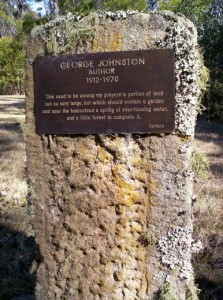 George H.Johnston (1912-1970) – best known for his book, “My Brother Jack,” he was a war correspondent during WWII for the Melbourne “Argus” newspaper. Click on images to enlarge. #################################################################################
George H.Johnston (1912-1970) – best known for his book, “My Brother Jack,” he was a war correspondent during WWII for the Melbourne “Argus” newspaper. Click on images to enlarge. #################################################################################
Sad Sack’s Military Humor –
################################################################################
Farewell Salutes –
Vernon Casanave – Palm Bch, FL; US Army Air Corps, WWII, SSgt.
Hiram Davidson – Little Rock, AR; US Army, Korea & Vietnam, Sgt. Major
Peter Dawson – brn : Yorkshire, UK & Horsey, AUS; Royal Navy, 10 yrs.,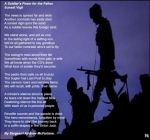
Thomas Gordon – Pueblo, CO; US Army Air Corps, WWII
St. Clair Knight Jr. – Greenville, SC; US Army, WWII, ETO, Capt., 102nd Infantry Div.
Albert Laubenstein – Saskatoon, CAN; RC Artillery & Infantry/Lincoln & Welland Reg., ETO, KIA 1/26/45
Erwin Murdock – Boynton Bch., FL; US Navy, WWII, PTO, gunner’s mate 2nd class
Melvin Raley – Gibson, GA; US Army, WWII, ETO, H Co/22 Inf.Reg/4th Inf.Div/3rd Army
Charles Stevenson – Timaru, NZ; RNZ Army # 821225, 27 MG Battalion
Marvin Underwood – Evansville, IN; US Army, WWII, PTO, 158th RCT, Purple Heart, Bronze Star #################################################################################
Posted on April 27, 2015, in First-hand Accounts, WWII and tagged 1940's, ANZAC, Australia, combat, History, Japan, Military, Tributes, USA, veterans, WW2, WWII. Bookmark the permalink. 57 Comments.
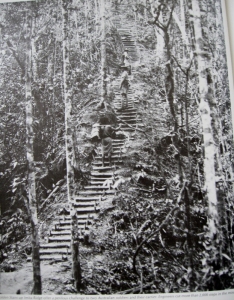

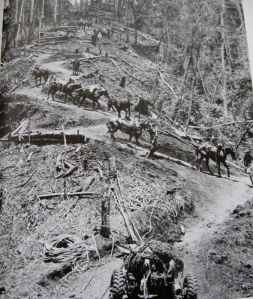
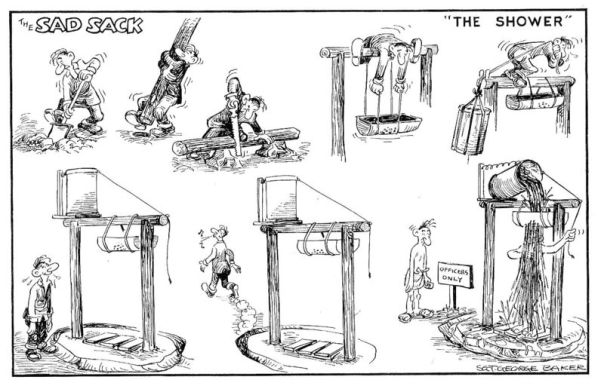







Reblogged this on KCJones.
LikeLike
Thank you very much. The correspondents add their own style of writing about events, don’t they?!
LikeLike
Humour is essential for survival.
LikeLike
True, so true, Shelley!
LikeLike
While his words gives a reader some flavor of that environment, only those that were there can relive the challenges to their macabre fullest. Even the author cannot describe how young men coped with being surrounded by death or the ugly realization the steps may lead to their insanity.
LikeLike
In this case, the author was there, but I agree that someone as myself will never know exactly – I can only study it. Thank you for reading today!
LikeLike
I’ve often wondered (without being in the least bit sorry for them) if the Japs didn’t find the going a bit tough too, sometimes. One never hears of jungles in Japan so I think it would be hard to truthfully claim that they were ‘to the manner born’.
As folk say “When the going gets tough, the tough get going” and guys do what they gotta do. What would be worse—the reeking steaming untrodden jungles or (say) the living deep-freeze that was Stalingrad in winter, or the Arctic convoys? Yeuch …
Wasn’t it Sherman who said that “War is hell” and then went to great lengths to make it even more so? But he had a point … which is why I repeatedly say that the ‘decision makers’ who send guys off to war should be on the first boat out (plane these days) themselves. Leading.
You’re doing a great job in bringing reality to peoples’ minds, GP. Long may it last.
And thanks again for ol’ Sack—the Sack’s scribe was my kind of guy, a realist. Long may they last too~!
LikeLike
I don’t know how one would judge which was worse – freezing or jungle swamps [I’m sure if the life-style of the fruit fly has been studied – just about anything can be evaluated], but I know I’m not going to try it anytime soon. I hope this site does do exactly as you state – show people that “War is Hell” is NOT just a quote or cliche and I agree – the politicians should be the first in with their dukes up! Everyone seems to have enjoyed Sad Sack – I could kick myself for taking so long to remember him!!!!
LikeLike
He had a sister too, you know … Sadie …
LikeLiked by 1 person
The Golden Staircase sounds truly delightful, and that Sad Sack is SO typical of the army!
LikeLike
Quite opposites of the spectrum, aren’t they! Glad you came to visit.
LikeLike
How I loved Sad Sack.
As a child on my Uncle’s Farm during the summers in Indiana,
I would crawl under my cousins beds and drag out all of theirs when they were not there.
I read them ’til my eyes my blurry!
LikeLike
Good to see you, Donna, hope you are well. I know [Sad Sack], I can not believe it took me so long to remember him – you’ll be seeing more of the ol’ guy!
LikeLiked by 1 person
Great memories!!!
LikeLiked by 1 person
I can picture the soldiers stopping to shake the hand, seeking a second of macabre humor to counter the unrelenting horror. As for hiking up mountains, I get that, having spent years doing so leading 100 mile backpack treks. It’s one step at a time. —Curt
LikeLike
I was never one much for hiking, Curt, though I used to walk – everywhere! I thought Mr. Johnston’s writing was superb. Thanks for coming by.
LikeLiked by 1 person
amazing article Brad, so well done. I was fortunate enough to gifted an album belonging to a relative who received the purple heart in WW2 , detailing his experience and newspaper clipping, photos etc. It is a treasure of memorabilia, I feel so fortunate.
LikeLike
They are treasures, Hollie, and I’m thrilled you are treating them with the respect they deserve. You are very lucky!
LikeLiked by 1 person
What a dreadful place.
LikeLike
I can not think of one worse, Ann. Thank you for reading Johnston’s words.
LikeLiked by 1 person
“Good on ya sport”
LikeLike
I tip me lid.
LikeLike
You’re an honorary Aussie gp but it’s dips me lid not tips, you’re a good bloke and that’s the highest acolade that an Aussie can bestow
LikeLike
I thank you very much, Beari. Nothing like having dual-citizenship, eh?
LikeLiked by 1 person
Very descriptive illustration of the Golden stairway by Johnston.
Every step heart wrenching.
Again another link for me to pursue with his book.
Thanks gp..
LikeLike
I agree, Ian. His writing is very fluid and draws you right into his scene – I was captivated.
LikeLike
The first thought that comes to my mind is that these terrible scenes would have stayed in their minds for the rest of their lives. As for Sad Sack, I had a shower very similar to that at a rustic Texas cabin a few years ago. It did have a piece of canvas around it. Memories!
LikeLike
I hope you got to use your shower – not like poor Sad Sack here!! You know the memories hung over the soldiers’ minds till the end.
LikeLike
indeed it did stay with them Gypsy it caused the death of my future wifes father in 1967, I won’t go into the details suffice to say it’s shattering
LikeLike
I’m certain it was, the more I learn of the New Guinea fighting, the more I understand the Aussie pride and my father’s admiration of them.
LikeLike
I had two uncles, who when they returned from WWII were always very nervous and basically stayed away from crowds. Their bodies seemed to shiver quite often for no reason at all. As a child, I didn’t understand the reason, but do remember their difficulties. Now, I’m learning more about the terrible things they must have seen. Thanks to all of you for letting the real story be known.
LikeLike
And… I don’t put it ALL in. We have some younger readers and I do get nervous about putting in the even more gruesome aspects of battle. Your uncles went through quite a bit before coming home. God love them.
LikeLike
My wifes father, an Engish migrant to Australia, joined the Australian Army became a ‘Digger’ and fought the great fight in Papua NG, he died of wounds received there some years later (1967 to be exact). He was a TPI, at the end of the war, (Totally and Permanently Incapacitated) and died quite tragically all those years later.
This happened many years before I met his daughter, and I never got to meet or know him.
LikeLike
My heart goes out to the soldier and his family. So many pay the price for war. Thank you for sharing your story, Beari.
LikeLike
Respect for a warrior. I remember reading about an American warship blown up by the Japanese during the Battle off Samar, where the sailors treading water, clinging to bits of their ship as the Japanese warship sailed by, saluting them for a battle well-fought.
LikeLike
Yes, I remember hearing or reading that somewhere, Jacqui. Other times you hear of the ship going by the survivors and machine-gunning them – it takes all kinds.
LikeLike
Great writing. How they still managed humour is incredible.
LikeLike
Almost everyone who has commented has mentioned their ability to laugh – seems almost surreal after they were going through and no end in sight. Thanks for dropping by.
LikeLiked by 1 person
Oh my – this sounds well worth a read! It’s the most visual image from written words!
LikeLike
That’s how I felt, Sammy. A narrative that puts you right into the mix with the men.
LikeLiked by 1 person
Wow. What a provocative post. This is a book I’d like to read. How horrible to climb up the stairs let alone build it.
LikeLike
Quite a project I agree, Cindy. How anyone came out off the Kokoda Track is beyond me!
LikeLiked by 1 person
“Good on you sport”…after all they went through and that gruelling, merciless “bloody track”, they still had a sense of humour. A great post GP.
LikeLike
Prety amazing, eh?! A tough bunch of soldiers! Thank you for visiting, Norma.
LikeLike
A really interesting post, thank you. Australians can have a grim sense of humour!
LikeLike
Hey, whatever makes you get through the day – in the situation they were in, I’m surprised they could do it at all! Thanks for stopping by, John.
LikeLike
Ha – the show comic is funny! and thanks for the excerpts “You listen to your legs creaking and stare at the ground and think of the next stretch of mud and you wonder if the hills will even end.” he seems like such great writer.
LikeLiked by 2 people
He certainly does! I don’t think anyone could make me feel more like I was actually there than him. Thank you for visiting, I’m glad I gave a laugh too.
LikeLike
🙂
LikeLiked by 1 person
well it makes me glad I was not there as well 🙂
LikeLike
So true!
LikeLike
🙂 have a nice day dude
LikeLiked by 1 person
It is hard to even begin to imagine how hard that was.. Yet still they shook that bony hand and laughed,
LikeLiked by 1 person
They never cease to amaze me! Thanks for coming!
LikeLike
Always a pleasure 🙂
LikeLiked by 1 person
Mr. Johnston’s account made me feel as though I were there.
LikeLike
I know, isn’t that eerie?! Thanks for reading it so early this morning, Adam!
LikeLike